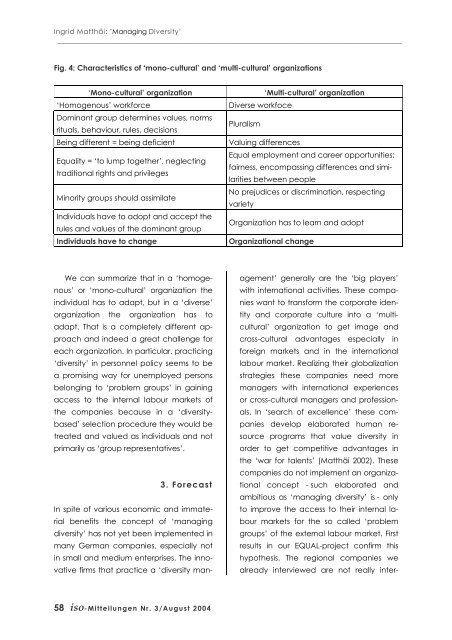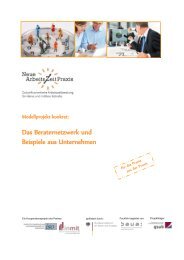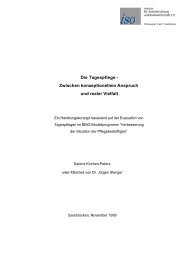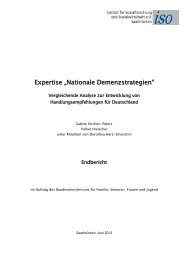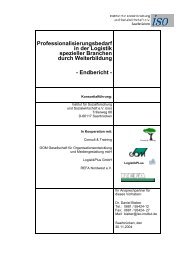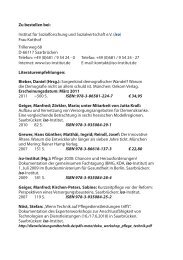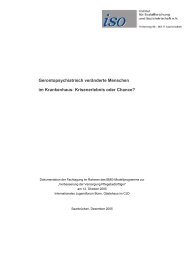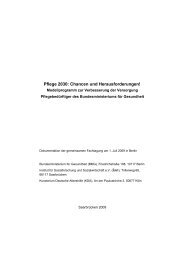iso-NEWS - Institut für Sozialforschung und Sozialwirtschaft eV
iso-NEWS - Institut für Sozialforschung und Sozialwirtschaft eV
iso-NEWS - Institut für Sozialforschung und Sozialwirtschaft eV
Erfolgreiche ePaper selbst erstellen
Machen Sie aus Ihren PDF Publikationen ein blätterbares Flipbook mit unserer einzigartigen Google optimierten e-Paper Software.
Ingrid Matthäi: ’Managing Diversity’<br />
__________________________________________________________________________________________<br />
Fig. 4: Characteristics of ‘mono-cultural’ and ‘multi-cultural’ organizations<br />
58<br />
‘Mono-cultural’ organization ‘Multi-cultural’ organization<br />
‘Homogenous’ workforce Diverse workfoce<br />
Dominant group determines values, norms<br />
rituals, behaviour, rules, decisions<br />
<strong>iso</strong>-Mitteilungen Nr. 3/August 2004<br />
Pluralism<br />
Being different = being deficient Valuing differences<br />
Equality = ‘to lump together’, neglecting<br />
traditional rights and privileges<br />
Minority groups should assimilate<br />
Individuals have to adopt and accept the<br />
rules and values of the dominant group<br />
Equal employment and career opportunities;<br />
fairness, encompassing differences and similarities<br />
between people<br />
No prejudices or discrimination, respecting<br />
variety<br />
Organization has to learn and adopt<br />
Individuals have to change Organizational change<br />
We can summarize that in a ‘homogenous’<br />
or ‘mono-cultural’ organization the<br />
individual has to adapt, but in a ‘diverse’<br />
organization the organization has to<br />
adapt. That is a completely different approach<br />
and indeed a great challenge for<br />
each organization. In particular, practicing<br />
‘diversity’ in personnel policy seems to be<br />
a promising way for unemployed persons<br />
belonging to ‘problem groups’ in gaining<br />
access to the internal labour markets of<br />
the companies because in a ‘diversitybased’<br />
selection procedure they would be<br />
treated and valued as individuals and not<br />
primarily as ‘group representatives’.<br />
3. Forecast<br />
In spite of various economic and immaterial<br />
benefits the concept of ‘managing<br />
diversity’ has not yet been implemented in<br />
many German companies, especially not<br />
in small and medium enterprises. The innovative<br />
firms that practice a ‘diversity man-<br />
agement’ generally are the ‘big players’<br />
with international activities. These companies<br />
want to transform the corporate identity<br />
and corporate culture into a ‘multicultural’<br />
organization to get image and<br />
cross-cultural advantages especially in<br />
foreign markets and in the international<br />
labour market. Realizing their globalization<br />
strategies these companies need more<br />
managers with international experiences<br />
or cross-cultural managers and professionals.<br />
In ‘search of excellence’ these companies<br />
develop elaborated human resource<br />
programs that value diversity in<br />
order to get competitive advantages in<br />
the ‘war for talents’ (Matthäi 2002). These<br />
companies do not implement an organizational<br />
concept - such elaborated and<br />
ambitious as ‘managing diversity’ is - only<br />
to improve the access to their internal labour<br />
markets for the so called ‘problem<br />
groups’ of the external labour market. First<br />
results in our EQUAL-project confirm this<br />
hypothesis. The regional companies we<br />
already interviewed are not really inter-


